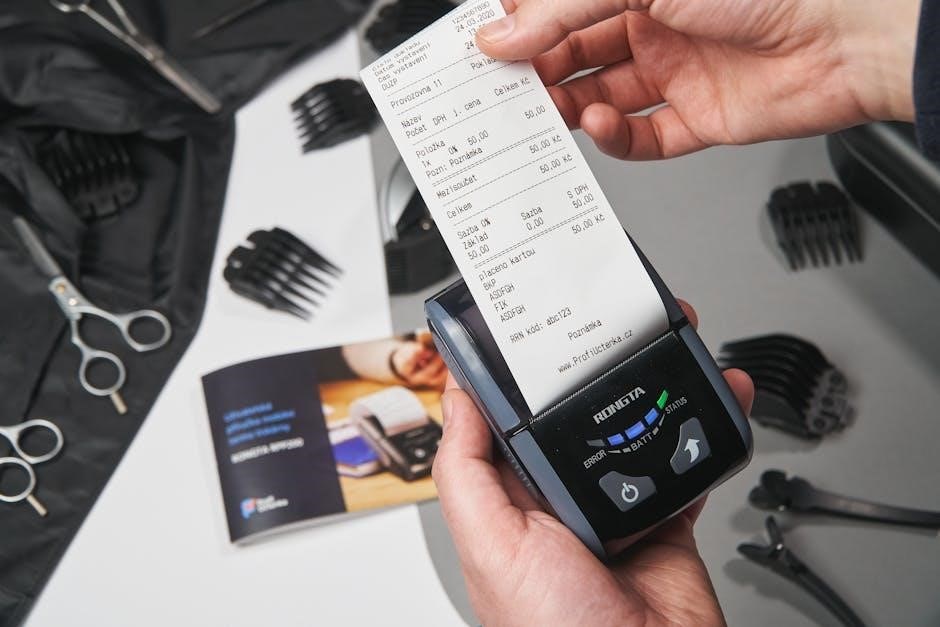The North Carolina Commercial Drivers Manual is a comprehensive guide for aspiring commercial drivers, covering essential topics like safe driving practices, traffic laws, and cargo transport regulations.
Purpose and Importance of the Manual
The North Carolina Commercial Drivers Manual serves as the primary resource for individuals seeking a Commercial Driver License (CDL). Its purpose is to provide detailed information on safety regulations, traffic laws, and best practices for operating commercial vehicles. The manual is essential for preparing for CDL tests, ensuring drivers understand their responsibilities and how to operate safely. It also outlines the licensing process, medical requirements, and endorsements needed for specific types of commercial driving. By studying the manual, drivers can reduce risks on the road, avoid penalties, and maintain compliance with state and federal regulations. It is a critical tool for both new and experienced drivers, fostering safe and efficient transportation in North Carolina.
Overview of Commercial Driver Licensing in North Carolina
The Commercial Driver Licensing (CDL) program in North Carolina is administered by the N.C. Division of Motor Vehicles (DMV). It ensures that drivers of commercial vehicles meet strict safety and qualification standards. To obtain a CDL, applicants must hold a valid North Carolina driver’s license, pass a physical examination, and complete required knowledge and skills tests. The program categorizes licenses into Class A, B, and C, depending on the type and weight of the vehicle. Endorsements are also required for specialized cargo, such as hazardous materials or tank vehicles. The DMV adheres to federal regulations while tailoring requirements to state-specific needs, ensuring public safety and efficient transportation. This system is designed to maintain high standards for commercial drivers operating within North Carolina.

Eligibility Requirements for a Commercial Driver License (CDL)
To qualify for a CDL in North Carolina, applicants must be at least 21 years old, meet residency requirements, pass a medical exam, and hold a valid driver’s license.
Age and Residency Requirements
In North Carolina, CDL applicants must be at least 21 years old to apply for a commercial driver license. Additionally, they must be residents of North Carolina and provide proof of residency, such as a valid state ID or utility bills. Non-citizens must provide documentation of lawful permanent residency or another approved status. The age requirement ensures maturity and experience, while residency verification guarantees that drivers are accountable under state laws. These requirements are critical for eligibility and must be met before proceeding with the CDL application process. Proper documentation, such as birth certificates and Social Security cards, is also necessary to confirm identity and eligibility. Meeting these criteria is the first step toward obtaining a CDL in North Carolina.
Medical Certification and Physical Examination
Applicants for a Commercial Driver License in North Carolina must undergo a physical examination and provide medical certification; This ensures they meet federal and state health standards for operating commercial vehicles safely. The examination must be conducted by an FMCSA-certified medical examiner. Key areas evaluated include vision, hearing, blood pressure, and physical condition. Drivers must disclose any medical conditions that could impact their ability to drive. The certification is typically valid for 2 years but may vary depending on health status. Maintaining valid medical certification is mandatory to retain CDL privileges. Failure to comply can result in license suspension. This process ensures public safety by verifying that commercial drivers are fit to operate heavy vehicles responsibly.

The Licensing Process
Obtaining a CDL in North Carolina involves passing general knowledge and practical exams, meeting medical requirements, and completing application steps outlined in the manual.
Steps to Apply for a CDL
Applying for a CDL in North Carolina requires several steps, starting with studying the official manual and passing a vision test. Candidates must submit required documents, such as proof of identity and residency, and pass a series of knowledge tests. Once the written exams are completed successfully, applicants receive a Commercial Learner’s Permit (CLP). Within 14 days, they can schedule a skills test, which includes a pre-trip inspection, basic vehicle control, and on-road driving. Fees for the application process and licensing are specified by the DMV.
The manual provides detailed guidance to ensure applicants meet all requirements efficiently and understand the process thoroughly.
Fees and Payment Methods
Obtaining a CDL in North Carolina involves specific fees that cover application, testing, and licensing costs. The CDL application fee is currently mandated by the DMV, and additional charges apply for skills tests and license issuance. Payment methods accepted by the DMV include cash, credit cards, checks, and money orders. Fees may vary depending on the type of CDL class and endorsements required. Applicants are advised to verify the latest fee schedule on the official DMV website or at a local office. Proper payment ensures the application process proceeds smoothly, and all charges are non-refundable once the process is initiated.

Key Chapters in the North Carolina CDL Manual
The manual covers safe driving practices, North Carolina traffic laws, vehicle inspection, cargo transport, and hazard materials handling, ensuring comprehensive knowledge for commercial drivers.
Safe Driving Practices
Safe driving practices are a cornerstone of the North Carolina CDL Manual, emphasizing accident prevention and responsible vehicle operation. Topics include speed management, following distance, and handling adverse weather conditions. Drivers learn techniques to maintain control, such as adjusting speed on wet roads and using low-beam headlights in low visibility. The manual also covers the proper use of brakes, signaling, and navigating intersections safely. Special attention is given to sharing the road with pedestrians, cyclists, and other vehicles. Additionally, it addresses the risks of driver fatigue and the importance of rest breaks. These practices are designed to ensure commercial drivers operate safely, reducing the risk of accidents and protecting themselves and others on the road. Mastery of these principles is crucial for obtaining a CDL and maintaining a safe driving record.
North Carolina Traffic Laws
North Carolina traffic laws are detailed in the CDL Manual to ensure compliance and safety on the road. Commercial drivers must adhere to specific regulations, including speed limits, right-of-way rules, and signaling requirements. The manual emphasizes the importance of obeying traffic signals, lane markings, and posted signs. Special attention is given to laws governing commercial vehicles, such as weight restrictions, cargo securement, and hours of service. Drivers are also reminded of the consequences of violations, such as fines or license suspension. Understanding and following these laws is critical for maintaining legal driving privileges and ensuring public safety. The manual serves as a reference to help CDL holders navigate North Carolina’s traffic regulations effectively.
Vehicle Inspection and Maintenance
Vehicle inspection and maintenance are critical for ensuring the safety and efficiency of commercial vehicles in North Carolina. The CDL Manual outlines detailed procedures for conducting pre-trip, en-route, and post-trip inspections to identify potential issues before they lead to breakdowns or accidents. Drivers must check essential systems such as tires, brakes, lights, and mirrors to ensure compliance with safety standards. Regular maintenance is also emphasized to prevent mechanical failures. The manual provides guidelines for documenting inspections and addressing defects promptly. Proper vehicle upkeep not only prevents accidents but also helps avoid fines and penalties associated with non-compliance. By adhering to these practices, commercial drivers can ensure their vehicles are roadworthy and operate safely on North Carolina’s highways.
Transporting Cargo Safely
Transporting cargo safely is a critical responsibility for commercial drivers in North Carolina. The CDL Manual emphasizes proper load securement, weight distribution, and adherence to cargo-related regulations to prevent accidents and ensure public safety. Drivers must inspect cargo before and during transit to ensure it is properly secured and evenly distributed. Overloading or improperly balanced cargo can lead to vehicle instability and increased risk of accidents. The manual also covers specific guidelines for hazardous materials, oversized loads, and refrigerated goods. Understanding and following these protocols helps drivers comply with state and federal regulations while safeguarding themselves, their cargo, and other road users. Safe cargo practices are essential for maintaining a safe and efficient transportation system in North Carolina.

Endorsements and Restrictions
Endorsements and restrictions in North Carolina’s CDL Manual define specific permissions and limitations for commercial drivers. Endorsements like Hazardous Materials or Tank Vehicles require additional testing and certification. Restrictions, such as air brake or passenger vehicle limitations, are applied based on driver qualifications and test performance. Understanding these is crucial for legal and safe commercial driving.
Types of CDL Endorsements
North Carolina offers various CDL endorsements to qualify drivers for specialized roles. The Hazardous Materials (H) endorsement requires a background check and knowledge of handling dangerous goods. The Tank Vehicle (N) endorsement is for drivers transporting liquids or gases in tanks. The Passenger (P) endorsement allows operation of buses carrying 16+ people, while the School Bus (S) endorsement is mandatory for driving school buses. The Doubles/Triples (T) endorsement permits towing two or three trailers. Each endorsement demands specific testing and certification, ensuring drivers are proficient in their specialized area. Understanding these endorsements is key to pursuing the right commercial driving career in North Carolina.
Restrictions on CDL Privileges
CDL privileges in North Carolina may be restricted based on driving history, vehicle type, or specific violations. Common restrictions include the “E” endorsement for automatic transmissions only or the “L” restriction for vehicles without air brakes. Drivers under 21 cannot operate interstate commerce vehicles. Serious traffic offenses, such as reckless driving or DUI, can lead to temporary or permanent disqualification. These restrictions ensure public safety and compliance with federal and state regulations. Understanding these limitations is crucial for maintaining valid CDL status and avoiding penalties; Restrictions are clearly outlined in the manual to help drivers navigate their specific licensing conditions and career opportunities in the trucking industry.

Disqualifications and Penalties
Disqualifications and penalties for CDL holders in North Carolina include license suspension or revocation due to serious traffic violations, such as reckless driving or DUI, impacting career opportunities.
Violations Leading to Disqualification
Serious traffic offenses can lead to the disqualification of a Commercial Driver License (CDL) in North Carolina. These violations include reckless driving, driving under the influence (DUI), speeding excessively, and causing accidents. Other offenses, such as leaving the scene of an accident or operating a commercial vehicle without a valid CDL, can also result in disqualification. Additionally, accumulating multiple speeding tickets or being convicted of hazardous material violations may lead to license suspension. The duration of disqualification varies depending on the severity of the offense, ranging from 60 days to lifetime bans for repeat or egregious violations. These penalties underscore the importance of adhering to traffic laws to maintain CDL privileges and ensure road safety.
Consequences of Traffic Offenses
Traffic offenses for Commercial Driver License (CDL) holders carry severe consequences, as they jeopardize public safety and professional credentials. Even minor infractions can lead to points on a driver’s record, increased insurance rates, and potential job loss. More serious offenses, such as reckless driving or speeding, may result in fines, license suspension, or mandatory court appearances. Employers often terminate drivers with compromised licenses, as their insurance and operational costs rise. Repeat violations can lead to permanent revocation of CDL privileges, significantly impacting career prospects. Additionally, federal regulations mandate disqualification for drivers convicted of severe offenses, further complicating the path to reinstatement. These penalties highlight the critical need for CDL holders to adhere strictly to traffic laws and maintain a spotless driving record.
Study Resources and Practice Tests
Online tools and practice tests are essential for mastering the North Carolina CDL manual. Interactive guides and audio resources help drivers prepare efficiently for their exams and ensure success.
Online Tools for CDL Preparation
Online tools and resources play a crucial role in preparing for the North Carolina CDL exams. The official North Carolina CDL manual is available online, offering detailed information on traffic laws, safe driving practices, and cargo transport. Additionally, interactive study guides and practice tests provide hands-on experience, helping applicants assess their knowledge and identify areas for improvement. Many websites offer audio-based learning materials for on-the-go preparation. Mobile apps, such as the North Carolina Driver Handbook App, allow users to practice anytime, ensuring a thorough understanding of the material. These digital resources make studying efficient and accessible, boosting confidence for the CDL exams.
Practice Test Formats and Strategies
Practice tests are essential for mastering the North Carolina CDL manual content. These tests are available online and mirror the actual exam format, covering topics like traffic laws, vehicle inspection, and cargo safety. Many platforms offer interactive formats with immediate feedback, allowing users to track progress and focus on weak areas. Strategies include setting a timer to simulate exam conditions and reviewing incorrect answers thoroughly. Additionally, mobile apps provide on-the-go access to practice questions, ensuring consistent study routines. By combining these tools with the official manual, applicants can build confidence and ensure they are well-prepared for the CDL exams.
The North Carolina Commercial Drivers Manual is a vital resource for safe and compliant commercial driving. It provides comprehensive guidance on licensing, regulations, and best practices, ensuring drivers are well-prepared for the road.
Final Tips for Mastering the CDL Manual
To master the North Carolina CDL Manual, dedicate time to thorough study and practice. Focus on understanding safe driving practices, traffic laws, and cargo handling. Use online tools like practice tests to reinforce knowledge. Regularly review the manual to stay updated on regulations and best practices. Seek guidance from experienced drivers or instructors for clarification. Prioritize understanding over memorization to ensure long-term retention. Consistent effort and practical application will help you excel in both the written and practical exams, making you a confident and responsible commercial driver in North Carolina.
